Mental health ambassadors Leon Cameron and Neville Jetta are encouraging players and coaches to ask for help when they need it
Collingwood star Dayne Beams is one of several players in recent years to take a break from footy for mental health reasons. And one player has described his actions as inspirational.
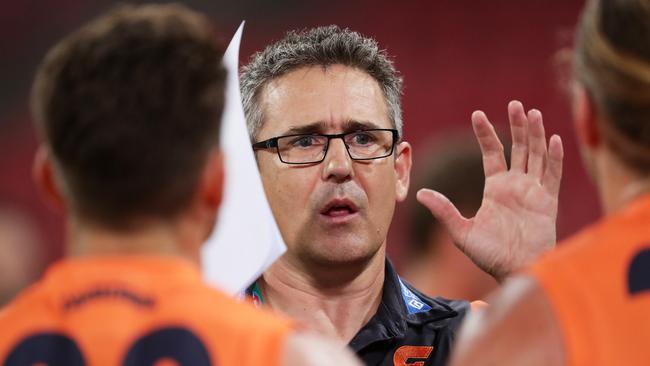
Sport
Don't miss out on the headlines from Sport. Followed categories will be added to My News.
Coaches have the most stressful jobs in the game and the public battles of Dean Laidley, Mark Thompson, James Hird and the late Danny Frawley have only put the coaching fraternity under a greater spotlight.
Ross Lyon said only the Prime Minister faced more scrutiny and pressure than an AFL senior coach and the AFL Coaches’ Association now distributes surveys as well.
Greater Western Sydney coach Leon Cameron said he completed six surveys a year, four of them pertaining to his mental wellness.
“I could say, ‘I’m fine, I’m fine, I’m fine’. But I jump in a survey, I answer it really honestly and if I need help then help is on the door straight away,” Cameron said.
Alan McConnell, who coaches the Giants’ AFLW team, mentors Cameron.
“I open up to him about issues I might be confronting at home or at work,” Cameron said.
“My life hasn’t gone like that (linear) — I don’t think anyone’s has. It goes up and down, up and down, and you just try to smooth out the bumps.
“If you can smooth them out by opening up a bit more you’re going to be better off.”
Relive classic AFL matches from the 60s to today on KAYO SPORTS. New to Kayo? Get your 14-day free trial & start streaming instantly >
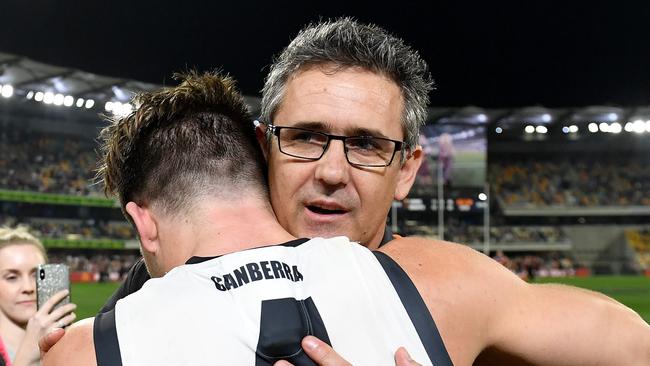
But how does Cameron monitor the mental health of his 45 players? Helping them settle in Sydney is a key.
“We’re an interstate club and when we have players leave home there’s going to be anxiety,” Cameron said.
“Call it homesickness or whatever, but if you don’t get to know them or ask the right questions about how they’re tracking on and off the field, you feel as though you can lose them.
READ PART 1 OF OUR AFL MENTAL HEALTH SERIES
“So we spend a lot of time in this area.”
Talents including Tom Boyd, Adam Treloar, Dylan Shiel, Devon Smith and Cameron McCarthy have all left the Giants to return home.
But a lot more — including Josh Kelly, Stephen Coniglio, Lachie Whitfield, Toby Greene, Nick Haynes — are committed for the long haul.
MORE AFL NEWS:
Richmond has parted ways with inaugural AFL Women’s coach
Cameron has witnessed the softly, softly approach evolve. Conversations are now king.
“I keep coming back to this word awareness — creating a better awareness,” Cameron, 47, said.
“If we talk about it more it’s OK and in the past maybe we just didn’t.”
Melbourne’s Neville Jetta, who — like Cameron — is an ambassador for Tackle Your Feelings, routinely discusses issues within his circle of trust.
“They don’t always have the answers, but it’s good just to be able to have the conversation,” Jetta said.
“I wouldn’t go two days without speaking to my parents. I live out in Greensborough, it’s a 45-minute drive to the football club, so there’s a lot of time in the car.
“So to be able to make a phone call to them, my brother, my sisters or even the psych or Simon Goodwin, it’s an easy way to just chat about things.”
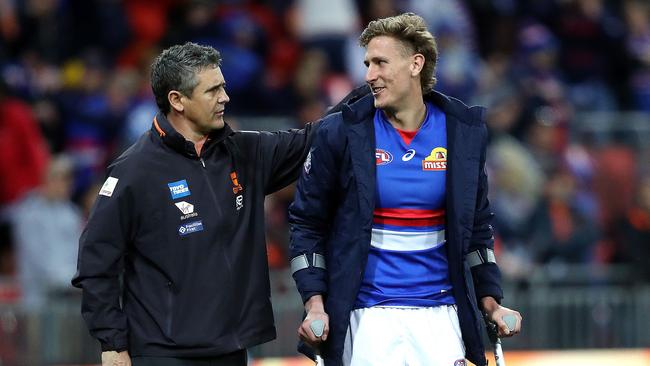
More and more of Cameron’s time is spent discussing off-field matters with Giants players.
“Some can be left alone a fair bit — it could be five or 10 minutes weekly — and some it could be an hour,” Cameron said.
“The big thing is it’s not just the senior coach. It’s the eight assistant coaches, it’s the club psychologist, it’s the three people in welfare, it’s the high performance guys.”
As Hawthorn assistant coach Sam Mitchell said: “Every coach has to have a part-time pastime as a psychologist”.
That signals alarm bells, given the savage job cuts assistants at every club felt last week.
What issues usually arise when players come to Cameron for help?
“It might be he’s struggling with his girlfriend or there might be an alcohol issue or there could be a drug issue — it could be anything,” he said.
“How do you actually talk about that? If you’ve got the right attitude in terms of this space then some of the best conversations happen at the most unlikely times.”
SUBSCRIBE TO THE SACKED PODCAST HERE
That wasn’t the case when Cameron joined Footscray as a teenager in 1988.
“In footy everyone keeps their cards close to their chest and sometimes it’s too late,” he said.
“There was a certain stigma around mental health and being soft. If you put your hand up and said, ‘This is too hard, I’m struggling at home’ or, ‘The training is too hard’, well, gee, he’s too soft, get rid of him.
“That was well and truly alive when I was playing. If you couldn’t do something or you couldn’t survive a camp or you couldn’t survive hard training or being told in a stern way then it looked like you were soft.
“Little did we know that some people were struggling with issues off-field. The awareness that’s been created by the AFLPA, especially in the past 10 years, is quite phenomenal.
“By no means am I an expert at this, it’s just that I’ve got a real, clear passion for it after coming from the country and seeing a lot of people struggle to talk about how they were feeling.
“The more people that talk about it the more people think it’s OK for me to bring it up.
“The No.1 thing is awareness; we’re trying to create an awareness that it’s OK to talk about it, and we’re trying to take the stigma away from it.”
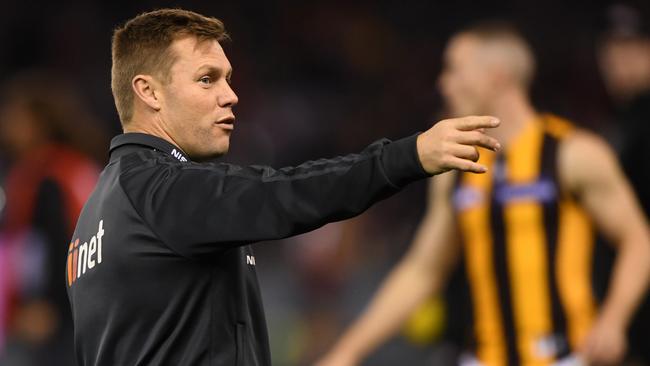
Jetta credited the fading stigma to players asking for help.
“Not only players, but superstars have put their hands up and said they’re not coping too well,” Jetta said.
“More recently having Dayne Beams put footy to the side — and footy is obviously something that we love — but our mental health is definitely the most important thing.
“It’s inspirational to put your hand up. To see players have the courage to do it gives you confidence to be able to speak up about your issues.
“If we can’t get our mental health right then we can’t enjoy football.”
In no particular order, Lance Franklin, Tom Boyd, Travis Cloke, Jack Steven, Mitch Clark, Jesse Hogan, Alex Fasolo and Beams have all taken a break from playing at some point.
Boyd started speaking to Western Bulldogs psychologist Lisa Stevens in 2016. But in the months after the club’s fairytale premiership Boyd suffered panic attacks, which fuelled anxiety, which fuelled depression.
By 2017 he was battling insomnia and barely slept for six weeks during a hellish period.
An independent industry review of football’s mental health space in 2018 — where the AFL, the AFLPA, the 18 clubs and the agents came together for the first time — spat out several recommendations.
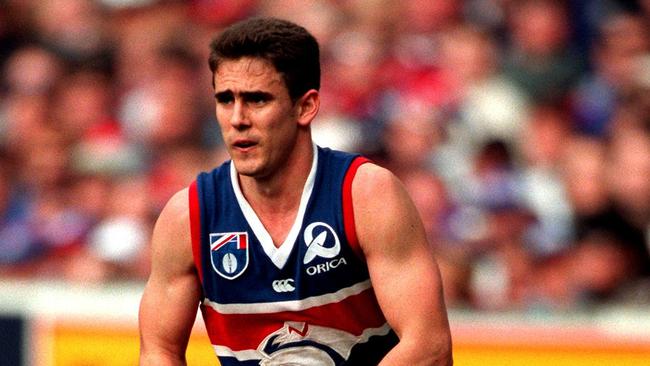
When a player decides to ask for help who is the first person they should call? The key learning from the review was that players need choice.
“It really can vary on where the player wants to go now,” AFLPA player development boss Ben Smith, who helped deliver that review, said.
“Now the player has an option within their club, through their club psychologist or club doctor, that they can raise an issue with.
“Or there’ll be times when a player decides they want to work removed from that environment and they can come directly to the PA’s psych service program.
“Often if the club is looking to specialist support for an issue they’ll come back to the psych triage network we have as well.
“The No.1 thing to support an individual with a challenge around their mental health is they know they’ve got choice. It’s imperative the player has choice.”
Earlier intervention helps address issues before they fester, and Smith noted that was becoming far more common.
“The increase in growth is around issues at the lower end of that mental health continuum — players that are challenged around relationships or anxiety and other things that are not depression or drug abuse,” Smith said.
“They are more comfortable to raise an issue earlier.”
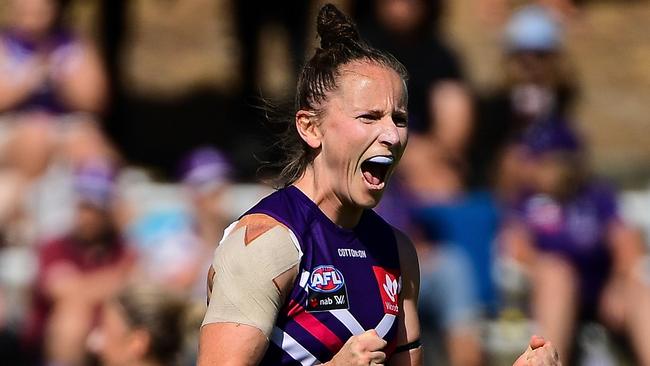
Contact hours are an issue for AFLW players, who don’t have the luxury of tapping into the same resources.
The women get access to the same AFLPA psych network and have a player development manager, but blocks such as mindfulness and meditation aren’t in their program.
“We’re full-time workers and football is our part-time job on the side,” Fremantle captain Kara Antonio, 28, said.
“I’d love to be able to focus the time we have on some of those really important key mental health messages and have the time to sit down with our player welfare managers.
“But the nature of it is you come straight from full-time work, get straight to training and then it’s straight home to bed.”
The Glen Waverley product has endured her own challenges. She relocated to Perth by herself at a young age and recently grieved a close friend’s suicide.
Before last season Antonio deactivated Facebook and she blocks out most social media while some teammates consume it like oxygen.
The Dockers were undefeated this year. But when they won just four games in the first two seasons it was Antonio, as skipper, who was left to face the music.
“That did affect me quite a bit more mentally than physical and the anxiety of facing the media after a loss,” Antonio said.
Marsh reckons media scrutiny has “a big part to play” in football’s mental health landscape.
“It’s high-pressure and things that perhaps shouldn’t be scrutinised are being scrutinised,” Marsh said.
“That wears everyone down, there’s no doubt about that. But the environments are better than they were and it’s on the right track.”
Tackle Your Feelings is a free mental health training program specifically for community AFL coaches. Go to tackleyourfeelings.org.au to register for the online program and see videos featuring Leon Cameron, Neville Jetta, Kara Antonio and Brett Ratten sharing their Tackle Your Feelings Story.
Originally published as Mental health ambassadors Leon Cameron and Neville Jetta are encouraging players and coaches to ask for help when they need it


